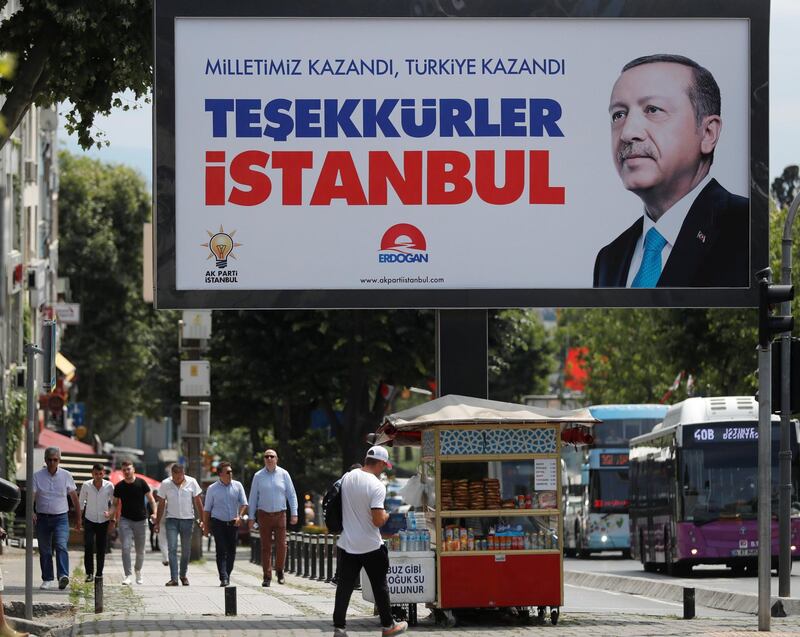Sunday's elections in Turkey, called more than a year early, were a gamble by President Recep Tayyip Erdogan. While he said the polls would stabilise the country amid a troubled time in the region, his critics said the elections were being rushed through so he could consolidate power before cracks in the economy became too apparent. Regardless, his gamble has paid off.
He was always expected to win and take the helm as the inaugural leader of the country's new presidential system, but it had been expected to take at least two rounds of voting. Instead, Mr Erdogan claimed victory in the early hours of Monday morning with 53 per cent of the vote. Beyond his electoral victory, he faces big challenges at home and internationally.
Renewed operations abroad?
Many critics say this year's military operation in Afrin, Syria, was primarily designed to boost both Mr Erdogan's reputation and nationalist sentiment prior to the elections; however, in his victory speech to supporters from the ruling party’s headquarters in Ankara he said that Turkey would now act more decisively against terrorist organisations. They will continue to "liberate Syrian lands", he said, so that the 3.5 million refugees currently living in the country can one day go home.
Domestic politics
Under the new system, Mr Erdogan will be able to form a government, appoint ministers and civil servants, issue decrees and appoint Supreme Court judges, and the checks and balances that usually keep a leader in line are extremely limited. But a poor showing for his party has left him heavily reliant on another coalition with ultranationalist allies the Nationalist Movement Party meaning the president does not have quite the absolute power he craved, though he is not far off. In his victory speech, Mr Erdogan promised he would "start implementing our programme by identifying our bureaucrats", which implies sweeping government personnel changes are likely on the way.
The Kurdish minority
The MHP are likely to veto talk of a return to a ceasefire with the Kurdistan Workers’ Party that collapsed in 2015, leading to a spate of bloody bombings and government military operations in the majority-Kurdish south east. Mr Erdogan has suggested the state of emergency imposed after 2016's failed coup, which has heavily affected those in the country's Kurdish areas, will be lifted after two years – it allows the president to rule by decree rather than needing the blessing of parliament to pass legislation. But under the new presidential system, he can do that anyway.
Economy
Turkey’s currency crash also put the economy at the heart of the election and it is likely to be a key issue in the country’s future. There are several problems to face: the decline of the Turkish lira, a massive 12 per cent rate of inflation and the perception that Erdogan is curtailing the central bank’s independence. Unemployment, especially among the youth, is high, too. In the immediate aftermath of the election result, the lira strengthened against the dollar, but in the longer term it will take tighter policies to avoid its downward trajectory. The president has vowed to become more involved in monetary policy to ease the problems, but more trouble almost certainly lies ahead.
Relationship with the West
There has been less tension between Turkey and the US since a preliminary agreement was reached on American military support for the People's Protection Units in Manbij at the start of the month. But there are still thorny issues, not least the US’s failure to extradite Fethullah Gülen, whom Turkey holds responsible for the failed coup. As Turkey's democracy backslides, its EU accession seems ever further away; however, Turkey will not want to lose EU investment and trade and the West will not sacrifice the geostrategic importance of the country so relations, although perhaps strained, seem set to continue.
______________
More on Turkey Elections:
[ Erdogan declares total victory but opposition remains defiant ]
Turkey elections - live updates as Erdogan aims to retain presidency
Everything you need to know about the Turkish elections
______________






